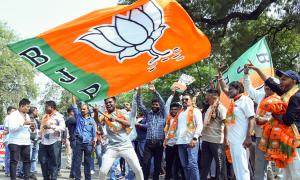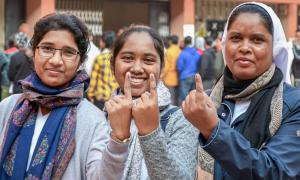If mainstream cinema catches you by the eyeball, there is a parallel stream of short feature films that often finds many takers. While the former is a crowd puller, the latter has a smaller yet loyal fan following who devour these short yet engaging tales of love, friendship, heartbreak, violence and tragedy.
To cater to such loyal viewers, various film clubs screen short films at regular intervals. The Mocha Film Club Mumbai, for instance, hosts a film festival on the first Sunday of every month at its Bandra outlet. The venue is shifted to Juhu café once in a while.
The fare comprises five to six diverse `shorts' (with a Mocha Shake thrown in) as the Mocha Club fondly names the films, for Rs 100. The films are in English, regional and foreign languages with subtitles.
The setting is quite informal. The conventional seating arrangement is done away with to make room for a projector and additional rows of chairs. People who gather here know how to make the most of the shows without cribbing about the lack of a gallery.
![]()
More on rediff.com!
![]()
![]()
![]()
![]()
Verdict on Mangal Pandey is unclear![]()
Priyanka Chopra on Barsaat![]()
Best of the week![]()
![]()
![]()
After the screening of each film, the floor is open for an interaction between the director or a member of the cast and the audience. Cyrus, one of the organisers, wears the compere's cap and in his characteristic chatty style, quizzes the director on various aspects of the film.
The most-asked first question (from an audience that mostly consists of filmmakers and filmmakers-in-the-making) usually is, what was the budget of the film. At times, discussions cease to be amiable if someone in the audience turns sarcastic as the director defends his baby.
Sometimes, the club organises a special screening. Last Wednesday, we were treated to a screening of director Ashvin Kumar's a 15-minute Little Terrorist, which was nominated for the Academy Awards in the short film category. The story revolves around a Pakistani Muslim lad, who while goofing around with his mates along the India-Pakistan border, stumbles across to the other side. The film depicts his interactions with the Indians, the paranoia of the Indian army on his arrival and how with a little help from his Indian friends (a village school master and his daughter), he is delivered safe to the arms of his fretting mother.
I arrived early for the screening and it took the show an eternity to begin. That allowed time for chitchat. With whom, you may ask. People start random conversations with people sitting next to them. These spontaneous interactions often mushroom into friendships or pure camaraderie among fellows of the fraternity.
I spotted a familiar face next to me, he visits the same gym as me (though I function like the visiting faculty there). I discover soon that Arif is a television producer-turned-actor and is to play the villain in Sujoy Ghosh's Home Delivery. The crowd now starts waltzing in. It comprises students and professionals from the film, media, advertising. You may also bump into the odd guy or girl from IT or medicine. I spot another familiar face, actor Shiny Ahuja (of Hazaaroin Kwaishain Aisi).
The projector screen springs to life and what unfolds turns out to be quite an engaging film. Extensive research, it seems, has gone into the film's making. Its sound director is a Brit, who sardonically puts in how `bleating goats and chattering onlookers' contributed to the `cacophony' during the shoot. Eventually, he informed, he had to recreate a lot of the sound in Sussex by manually making noises with shovels.
The film's cast is Indian. The actor who plays the role of the elderly schoolmaster, a Bollywood artist, is used to delivering melodramatic performances. Ashvin had a hard time getting him to tone down his actions. He succeeds brilliantly.
The 10-year-old protagonist Jamal was selected after many rounds of auditioning. The girl who plays Rani being much too urbane had to reinvent her body language and mannerisms by mimicking women folk from a village.
The production process had its share of disasters. One of the tents housing the exposed film rolls caught fire. Luckily, the rolls were unscathed.
Little Terrorist is an absolute treat as it handles a serious subject in a sensitive, non-patronising manner. My favourite scene is the last one, when the little boy goes home. To put things in context, his Indian Hindu friends shave off his hair lest the Indian jawans discovered him (they put their lives at risk to protect the boy).
One cannot help sympathising with the boy as he contemplates being reprimanded by his mother. Neither can one help enjoying the sequences where harder the boy's mother hits, the louder he laughs as he exchanges glances with his Indian friends hidden in the shadows, watching his reunion.
During the discussion at the end of the screening, Ashvin shared some annecdotes with us. One of the strangest comments he had recieved was from a Canadian woman, who was on the board of a film festival. "Why don't you change the last scene," she asked, as she felt the violence is detrimental to the cause of children's rights. But of course, Ashvin did not heed her request.
The Little Terrorist is a must-watch for all Indians, Pakistanis and in fact, people from every nationality, because it conveys a thing or two about the things that really matter -- tolerance, empathy and peaceful co-existence.








More from rediff